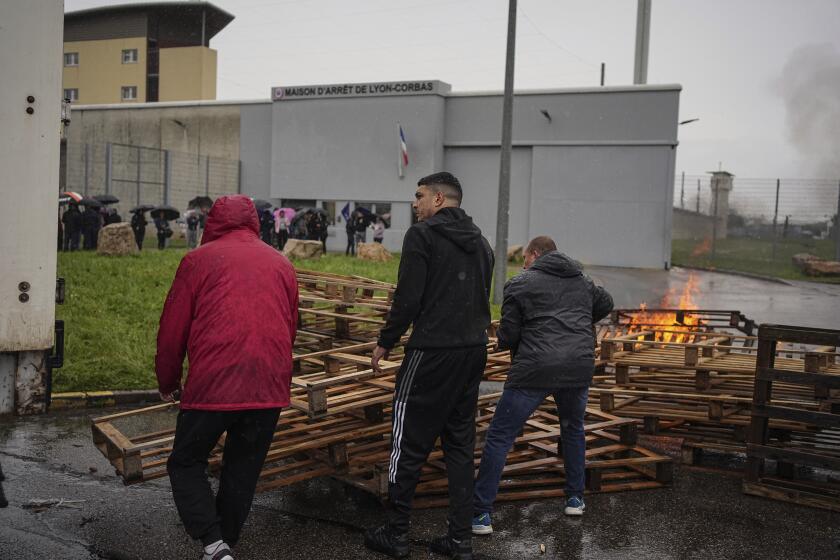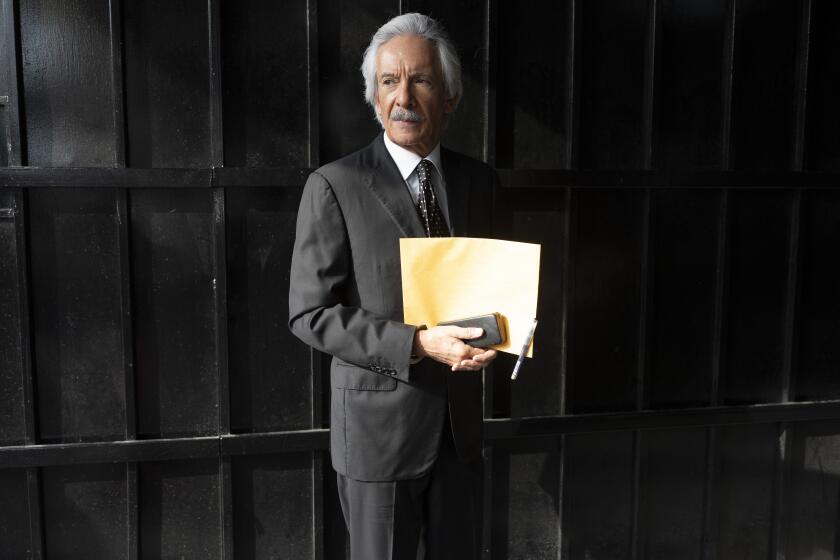Macedonia Keeps Pact Signing Under Wraps
Today’s scheduled signing of a peace deal by this country’s main political parties is being kept quiet: Neither the time nor the place will be disclosed, and a single television camera will record the event, according to a government spokesman.
Officials are afraid that, given the continuing armed conflict between Macedonian security forces and ethnic Albanian rebels, there could be a backlash if the ceremony was made public.
Since the agreement was initialed last week, angry ethnic Macedonian mobs have stormed through this capital several times, looting ethnic Albanian stores and trashing vehicles owned by Western aid organizations.
“[We] are hiding the place and time because it is not time to make a show,” Antonio Milososki, the government spokesman, said Sunday.
People are angry, Milososki said, because a peace agreement is going forward when government soldiers and police are being killed by the rebels.
The agreement between the four leading political parties, two ethnic Macedonian and two ethnic Albanian, is designed to end six months of conflict. It would guarantee the country’s ethnic Albanian minority more civil rights by elevating the legal status of the Albanian language and requiring that the police add many more ethnic Albanians to their ranks.
Macedonia has a population of about 2 million people, of whom at least 25% are ethnic Albanian.
Further inflaming popular sentiment Sunday were government allegations that ethnic Albanian soldiers who are part of the Kosovo Protection Corps have been illegally crossing Kosovo’s southern border to aid the ethnic Albanian guerrillas operating in Macedonia.
Kosovo--officially still a part of Serbia, the dominant republic of Yugoslavia--is now run by a United Nations civilian administration and patrolled by NATO-led forces known as the Kosovo Force, or KFOR. The Kosovo Protection Corps is made up largely of former ethnic Albanian fighters from the rebel Kosovo Liberation Army whose duties include civil protection.
In an angry letter over the weekend to U.N. Secretary-General Kofi Annan, Macedonian Prime Minister Ljubco Georgievski charged that U.N. authorities and the North Atlantic Treaty Organization troops that supervise Kosovo have ignored “armed aggression” from Kosovo that amounts to “a declaration of war” on Macedonia.
The allegations, which were read on Macedonian state television, were flatly denied by U.S. Maj. Barry Johnson, a NATO spokesman, who said that NATO forces in Kosovo have seen no such troop movements.
“With the amount of surveillance we have on the border, it would be very difficult for this to happen without our being aware of it,” Johnson said.
The need to keep today’s signing ceremony quiet and the fact that not a single politician has come forward to sell the peace deal to the public does not bode well for its survival.
“The agreement is coming too late. Even some of the political parties who are going to sign it . . . are not for it,” said Iso Rusi, a political analyst and editor in chief of Lobi, an Albanian-language weekly.
“These last few days have been about creating chaos,” he said.
Indeed, the fighting has become more heated in recent days. On Sunday, the government went on the offensive against suspected rebels in a village seven miles from Skopje before declaring a unilateral cease-fire in the early evening. Government forces also fought a heated battle, using helicopters and warplanes, with rebels who they alleged were from Kosovo.
In light of the continued fighting, some ethnic Macedonians regard the deal as a bitter pill foisted on them by Western negotiators. There is deep division over whether there is even a need to grant ethnic Albanians additional rights, and large numbers of ethnic Macedonians have never supported such concessions. They also doubt that the guerrillas will fully disarm after the peace agreement is in place, despite their promises to do so.
Among ethnic Albanians, there is more support for the agreement because they clearly would get expanded rights, but they are skeptical that it will be implemented and that they will be safe from reprisals by Macedonian police and security forces.
All of that worries Western diplomats who worked hard to mediate the sensitive deal.
“Paper isn’t expensive. . . . Everybody, including the negotiators, is very much aware of what this agreement is worth if there is no peace,” said one Western diplomat, who asked not to be identified because of the sensitivity of the negotiations.
Meanwhile, the rhetoric in both the ethnic Macedonian and ethnic Albanian press sounds ever more resigned to the inevitability of a war.
The latest edition of the weekly Macedonian-language newsmagazine Fokus features the fighting on its cover. “The End of Misconceptions: Macedonia, Get Ready for the War,” says the cover line.
The lead editorial says that the peace deal might bring about a cease-fire but that people should think about the next elections, in 2002, in terms of picking leaders who could see them through a prolonged conflict.
The largest Macedonian-language daily newspaper took a similar line. The main editorial’s headline this weekend was “We Have No Choice; We Were Chosen to Fight.”
One of the two main Albanian-language papers, Fakti, focused its latest editorial on the violent incidents in the last week that targeted ethnic Albanians.
The editorial decried the burning of a mosque in southern Macedonia and the killing of a 13-year-old Albanian boy in the center of the country.
More to Read
Start your day right
Sign up for Essential California for news, features and recommendations from the L.A. Times and beyond in your inbox six days a week.
You may occasionally receive promotional content from the Los Angeles Times.






